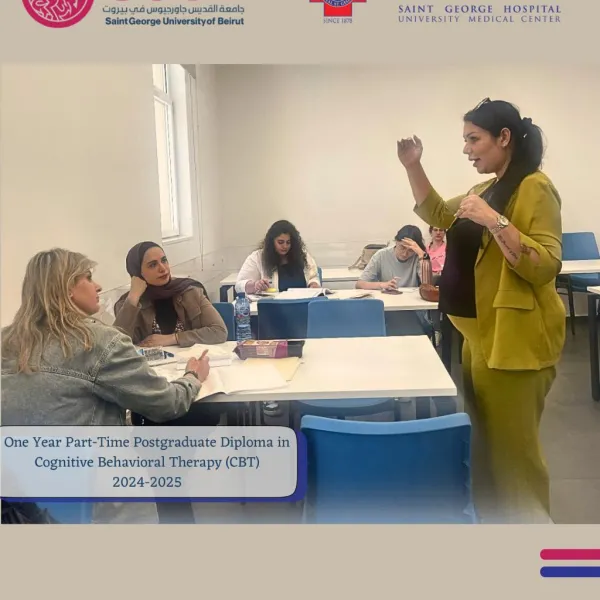Graduate Training Program in Clinical Psychology
The Department of Psychiatry and Clinical Psychology at SGHUMC, in collaboration with IDRAAC, offers a comprehensive Clinical Psychology Internship Program, designed to provide students registered in a clinical psychology university MA program with high-level academic, practical and supervised training. The program runs for 10 months, but a shorter 10-week curriculum is also available.
About the Training Program
Since 1981, our department has pioneered an integrated, multidisciplinary model combining psychiatry and clinical psychology—offering a unique environment for mental health education, research, and clinical practice. In addition to general adult services, the department includes specialized units for Child & Adolescent Psychiatry and Geriatric Psychiatry, as well as updated psychological assessment facilities.
Our training integrates clinical updates, diagnostic assessment and formulation, psychopharmacology, and research—providing trainees with the opportunity to apply theoretical knowledge to diverse real-world clinical populations in both inpatient and outpatient settings.
The program also serves as a preparatory platform for candidates interested in applying for our Postgraduate Diploma in Cognitive Behavioral Therapy (CBT) or doctoral studies abroad.
Eligibility Criteria
❖ Currently enrolled in a Master’s Degree in Clinical Psychology (or higher) from an academic institution.
❖ Applicants from related disciplines (e.g., Psychiatric Nursing, Social Work) may be considered on a case-by-case basis.
Program Duration & Structure
The program is 1 year long (10 months), runs every Monday through Friday, and is structured into three progressive modules:
Module I: Inpatient Units – Intakes and Evidence-Based Assessment and Case Formulation (1 month)
Trainees will spend one month on the inpatient floor. They will be exposed to patients with high comorbidity from different age groups (children, adolescents, adults and older adults). They will learn interviewing skills, diagnostic formulations and development of treatment plans for various psychiatric disorders.
Objectives:
- Learn to diagnose psychiatric disorders and mental health problems
- Acquire interviewing skills
- Use measurement scales for most diagnostic entities
- Write comprehensive psychiatric histories on patients
- Learn Case Formulation, including how to describe a person’s presenting problems, and how to use theory to make explanatory inferences about causes and maintaining factors that can inform treatment planning and interventions
- Develop treatment plans
- Learn basics of psychopharmacology
- Collaboratively work in a multidisciplinary team comprised of psychiatrists, clinical psychologists, nurses, residents, medical trainees, and staff on the inpatient floor
Procedure:
- Review of relevant clinical concepts and psychological theories
- Review principles of ethics and guidelines for best practice in psychotherapy as defined by the American Psychological Association and the European Association for Behavioral and Cognitive Therapy.
- Observation
- Participation in clinical interviews
- Personal reading assignments
- One to two hours of weekly supervision for diagnostic formulations by qualified and experienced clinical psychologists.
- Attendance to the academic activities of the department of psychiatry and clinical psychology (ex: grand rounds, journal clubs, IDRAAC research presentations).
Module II: Outpatient Psychiatry – Intake and Evaluation (3 months)
In addition to their inpatient experience, trainees will observe and be involved in intake sessions of new patients conducted by psychiatrists and assistants/nurses in the outpatient clinic where patients’ clinical formulations are processed. The duration for this module is 3 months. The following is a breakdown of what is expected of trainees. The duration of each phase is one month, however, the actual progression will depend on the trainee’s skill-acquiring capabilities
Objectives:
- Work with different populations (children, adolescents, adults and older adults) from different backgrounds presenting with different psychiatric problems
- Diagnose psychiatric disorders and mental health problems
- Refine interviewing skills.
- Write comprehensive psychiatric histories on patients
- Learn Case Formulation, including how to describe a person’s presenting problems, and how to use theory to make explanatory inferences about causes and maintaining factors that can inform treatment planning and interventions.
- Learn basics of psychopharmacology
- Collaboratively work in a multidisciplinary team comprised of psychiatrists, clinical psychologists, psychiatric assistants, and staff in the outpatient clinic
Procedure:
- Observation of psychiatrists and assistants completing psychiatric case histories
- Participation in clinical interviews and completing psychiatric case histories
- Personal reading assignments
- One to two hours of weekly supervision for diagnostic formulations by qualified and experienced clinical psychologists.
- Attendance to the academic activities of the department of psychiatry and clinical psychology (ex: grand rounds, journal clubs, IDRAAC research presentations).
- Review of relevant clinical concepts and psychological theories through assigned readings
- Review principles of ethics and guidelines for best practice in psychotherapy as defined by the American Psychological Association and the European Association for Behavioral and Cognitive Therapy.
Module III: Supervised Psychotherapy Practice (6 months)
Trainees will be working on the inpatient unit and the outpatient clinic. They will carry their caseload of patients under the supervision of qualified and experienced clinical psychologists. They will also complete intake sessions with new patients and learn basic and essential clinical skills needed for conducting psychotherapy. The duration of this module is 6 months.
Objectives:
- Acquire the basic and essential clinical skills needed to conduct psychotherapy
- Have the opportunity to practice and master a variety of specific, empirically based therapeutic interventions. It is to be noted that the psychotherapeutic approach used and taught in our department is mainly, Cognitive Behavioral Therapy
- Choose a population of interest (child/adolescent or adult)) and focus therapy skills and experience with such a population.
- Complete intake sessions and collaborate with psychiatrist depending on population preference (child/adolescent, adult, or geriatric)
- Develop basic understanding of psychological testing: administration, scoring and interpretation of results
- Develop Case Formulations, including how to describe a person’s presenting problems, and how to use theory to make explanatory inferences about causes and maintaining factors that can inform treatment planning and interventions.
- Develop treatment plans for patients
- Collaboratively work in a multidisciplinary team comprised of psychiatrists, clinical psychologists, psychiatric assistants, nurses, residents, medical students and staff on the inpatient unit and the outpatient department
Procedure:
- Complete intakes and collaborate with the corresponding psychiatrist (child/adolescent, adult, or geriatric)
- Mild to moderate clinical cases will be assigned to trainees to follow weekly in psychotherapy at the outpatient clinic.
- Video/audiotape recordings of sessions for discussion and feedback during supervision sessions.
- Exposure to psychological testing: observation of administration, scoring and interpretation of various psychological tests (ex: TOVA, Woodcock Johnson)
- Reading assignments of relevant clinical concepts and psychological theories
- Review principles of ethics and guidelines for best practice in psychotherapy as defined by the American Psychological Association and the European Association for Behavioral and Cognitive Therapy.
- One hour of weekly supervision by qualified and experienced clinical psychologists. Trainees will also sit in and listen to other trainees during their supervision sessions.
- Trainees may have the opportunity to sit in with psychologists in the department and observe sessions depending on patients’ consent.
- Attendance at the academic activities of the department of psychiatry and clinical psychology (ex: grand rounds, journal clubs, research).
Program Highlights
✔ LOPSY-Accredited hours fulfillment.
✔ Direct clinical contact with a broad range of psychiatric disorders.
✔ Multidisciplinary team involvement (Psychiatrists, Psychologists, Nurses, Residents).
✔ Participation in departmental seminars, clinical updates, journal clubs, and IDRAAC research activities.
✔ Access to cutting-edge assessment tools and CBT-based interventions.
Assessment & Certification
Evaluation is continuous and based on:
● Reviewing written psychiatric case histories
● Reviewing videotapes and audiotapes of therapy sessions during supervision
● Clinical Updates presentations on psychopathology
● Completing one case formulation at the end of the year
Successful completion leads to a Certificate of Clinical Internship from the Department of Psychiatry and Clinical Psychology at SGHUMC.
Tuition Fees (2024–2025)
● Module I: $600/month (1 month)
● Module II: $600/month × 3 months
● Module III: $600/month × 6 months
→ Total Fee: $6000 (for 10 months)
How to Apply
Applicants should submit the following by email to the Department of Psychiatry and Clinical Psychology at SGHUMC (see instructions below):
All application materials must be sent via email directly to Dr. Aimee Nasser Karam. No application form is required.
Your email should include the following:
● Full name
● University attended for your BA
● Name of the MA Clinical Psychology program you are currently enrolled in
● A clear statement that you are applying to the 10-month clinical internship
Please also attach the following documents:
● Your CV and academic transcripts
● Personal statement
● Preferably, one recommendation letter
Send your email to:
Aimee Nasser Karam, PhD.
Clinical Psychology Internship Director
📧 Aimeekaram@hotmail.com | Aimee.karam@idraac.org (include both emails)
CC: idraac@idraac.org
For more details on the program and admissions, please contact idraac@idraac.org.



